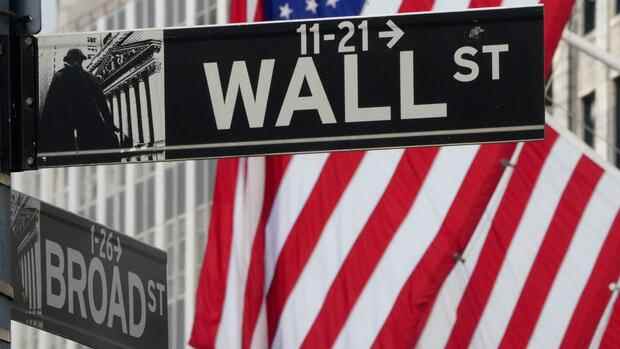The US markets have had a turbulent week.
(Photo: AP)
new York US stock markets are under selling pressure on the day of Russia’s attack on Ukraine. After initially consistently strong losses of more than two percent in some cases, the indices limited them to trading on Thursday. The technology index Nasdaq even turned positive.
The Dow Jones index of standard values fell by around two percent to 32,510 points by midday trading. The broader S&P 500 lost about one percent to 4,179 points, while the index of tech stocks struggled back up to 13,052 points. The market reactions were therefore significantly less than on the European stock exchanges.
Investors in US financial institutions withdrew in anticipation of punitive measures by the EU and the US government against the Russian financial sector in response to the attack by Russian troops. JP Morgan, Bank of America, Citigroup and Goldman Sachs Group shares fell as much as 4.5 percent.
A massive rise in oil prices, on the other hand, supported US companies in the sector. Exxon Mobil stocks were only slightly down. In the commodities sector, stockbrokers expect a massive supply shortage due to sanctions against the oil and natural gas supplier Russia, which catapulted prices upwards. As a result, the price of oil rose above $100 a barrel for the first time since 2014.
Top jobs of the day
Find the best jobs now and
be notified by email.
Look at other individual values
Moderna: The US pharmaceutical company has slightly raised its sales forecast for its Covid 19 vaccine for this year. Moderna is now expecting revenue of $ 19 billion, since production is to be ramped up after the production problems last year, as the US group announced. So far, Moderna had forecast sales of $18.5 billion and $3.5 billion from incremental sales, including booster shots. Now the management expects three billion from possible additional sales. Moderna also announced a $3 billion share buyback program. The share rose by around twelve percent.
Seaworld Entertainment: The theme park operator earned 92 cents a share last quarter, well above the consensus estimate of 29 cents. Revenue exceeded forecasts, more than doubling year-on-year, with parkgoers spending more per person than before the pandemic. The share rose by around 1.2 percent.
Gannett: USA Today publisher’s shares fell about 10 percent. The company had reported a bigger-than-expected loss and lower-than-estimated revenue for its most recent quarter. Gannett expects revenue to fall this year but wants to be profitable.
Alibaba: The China-based e-commerce giant’s stock fell more than 6 percent. The company had reported the slowest quarterly revenue growth since going public in 2014. Sales fell below analysts’ forecasts as competition intensified. However, quarterly profit beat estimates.
Norwegian Cruise Line: The cruise line’s shares fell nearly 2 percent. The company had reported a quarterly loss that was higher than expected. Travel values were already under pressure, largely due to the Russian invasion of Ukraine.
Booking Holdings: The travel services company reported adjusted quarterly earnings of $15.83 per share, well above the consensus estimate of $13.64. Sales also beat Wall Street forecasts. The company said it saw a significant improvement in bookings in the current quarter. Shares fell more than 10 percent amid weakness in travel stocks.
eBay: The company beat estimates by six cents with quarterly earnings of $1.05 per share, while the e-commerce company’s revenue was in line with forecasts. However, the stock came under pressure after Ebay forecast weaker-than-expected current-quarter results. Ebay shares lost 0.2 percent.
More: How investors can rely on the nutrition megatrend
